When we think of farm animals, the gentle clucking of chickens and their bustling presence often come to mind. However, whether you’re a seasoned farmer or just someone who enjoys spending time with these feathered creatures, a question that might have crossed your mind is, “Do chicken pecks hurt?” In this article, we’ll delve into the world of chicken behavior and the sensations caused by their pecks. Our goal is to provide you with a deeper understanding of the potential impact of these seemingly harmless gestures on humans. So, let’s explore the intriguing world of chicken pecks and discover whether these interactions are more than just a pinch of curiosity.
Understanding Chicken Behavior
Chickens, those familiar farmyard denizens, possess a rich tapestry of natural behaviors that extend beyond laying eggs and scratching at the ground. The act of pecking is at the heart of their social interactions. These birds are naturally inquisitive and have an innate drive to explore their surroundings. But, why do they peck?
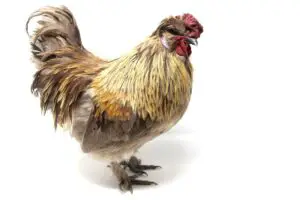

Intrinsically, chickens peck for various reasons that reflect their social and survival instincts. It’s a form of communication within the flock, a way to convey information about food, danger, or other noteworthy events. For instance, a quick peck at a tasty morsel of grain signals to others, “I’ve found something good to eat.” On the flip side, an assertive peck can communicate dominance and help establish a social hierarchy within the group.
This communication through pecking plays a crucial role in maintaining order and cooperation within a flock, allowing chickens to work together and ensure their collective well-being. Understanding these natural behaviors is a fundamental step in deciphering the potential impact of chicken pecks on humans.
The Anatomy of Chicken Beaks
To truly understand the phenomenon of chicken pecks, it’s essential to explore the intricacies of a chicken’s most distinctive feature – its beak.
The beak of a chicken is a remarkable tool, finely tuned for various functions. It’s both an instrument of precision and a versatile multitool in the chicken’s everyday life. Structurally, it comprises a hard outer layer and a sensitive, fleshier inner layer, which houses nerve endings. This unique combination makes the beak a sensory powerhouse, allowing chickens to interact with their environment in diverse ways.
One of the primary functions of a chicken’s beak is foraging. It enables the bird to search for and consume seeds, insects, and other edible tidbits. The pointed, slightly curved shape of the beak is ideal for pecking at the ground and probing for small prey. In this way, it serves as a tool for their survival and sustenance.
Apart from foraging, a chicken’s beak is also used for grooming. Chickens meticulously clean and preen their feathers to maintain hygiene and remove parasites. The precision of their beaks allows them to perform these tasks with great care.
Furthermore, the beak can be a tool for self-defense. While chickens are generally not aggressive towards humans, they may use their beaks to assert dominance or protect themselves if they feel threatened.
This inherent adaptability of the chicken’s beak, serving both utilitarian and social functions, plays a pivotal role in the interaction between chickens and humans, particularly when it comes to the question of whether chicken pecks hurt.
The Sensation of a Chicken Peck
Now that we’ve explored the intricacies of a chicken’s beak and its many functions, let’s delve into what it feels like when a chicken pecks a human.
The sensation of a chicken peck can be described as a unique experience. When a chicken’s beak makes contact with human skin, it often results in a sharp pinch or a brief sting. The sensation is akin to a sudden, mild, and momentary discomfort, leaving behind a subtle reminder that you’ve encountered a curious chicken.
Several factors can influence the intensity of this sensation. First and foremost, the chicken’s age plays a role. Young chickens tend to have softer beaks and may deliver a gentler peck, while older, more mature birds might apply slightly more force.

Additionally, the force of the peck itself is a significant determinant. A light, exploratory peck may barely be felt, while a more assertive or protective peck can be more noticeable. The location on the body where the peck occurs also matters. Delicate areas with thinner skin, like the fingers or the back of the hand, might make the sensation more pronounced compared to pecks on tougher, calloused areas.
Factors That Influence the Pain Level
The experience of a chicken peck can vary from person to person, and several factors come into play when considering the level of pain caused by these seemingly innocuous gestures.
First and foremost, the force with which a chicken pecks is a significant factor. Some chickens are naturally more assertive than others, and their pecks can range from gentle taps to slightly more pronounced pinches. This force is not uniform across all chickens, so the individual bird’s behavior plays a vital role.
Human pain tolerance and sensitivity also contribute to the equation. Everyone’s pain threshold differs, so what one person perceives as a minor discomfort, another may experience a more noticeable sensation. Factors like individual pain thresholds, previous experiences, and even psychological factors can all influence how a person perceives the pain of a chicken peck.
Additionally, the location on the body where the peck occurs plays a part. As mentioned earlier, areas with thinner or more sensitive skin can make the sensation feel more pronounced, while pecks on tougher, less sensitive areas might be less noticeable.
It’s also essential to consider the state of mind of the individual. If someone is anxious, fearful, or unfamiliar with chickens, they may be more sensitive to the sensation of a peck. Conversely, someone who is calm and accustomed to chicken behavior might find the pecks less disconcerting.
Do chicken pecks hurt
In our exploration of the world of chicken pecks, we sought to answer the question: “Do chicken pecks hurt?” The answer is a nuanced one.

When a chicken pecks a human, the sensation is typically a sharp pinch or a brief sting. It’s a unique experience, but it’s important to put this sensation into context. Chicken pecks are seldom painful in a way that causes lasting discomfort or harm to humans. Instead, they are a reminder of the intriguing natural behaviors of these feathered creatures.
Understanding the natural behavior of chickens, the anatomy of their beaks, and the various factors that influence the pain level of their pecks allows us to approach these interactions with a sense of appreciation and caution. The sensation of a chicken peck can vary based on the chicken’s age, the force of the peck, the location on the body, individual pain tolerance, and the state of mind. By respecting their space, choosing appropriate attire, and staying calm and patient, we can enjoy the company of chickens while minimizing the likelihood of getting pecked.
So, while chicken pecks can indeed cause discomfort, the overall impact on humans is generally quite mild. They serve as a fascinating insight into the natural world of these birds and remind us of the unique and delicate balance of interactions between animals and humans in our shared world.


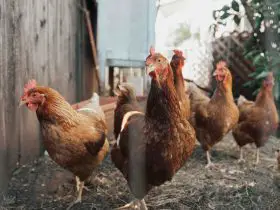

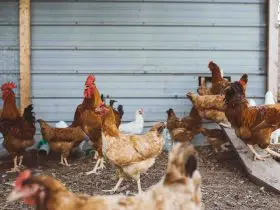



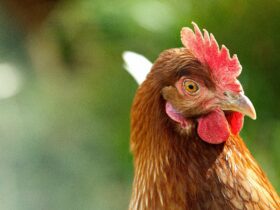

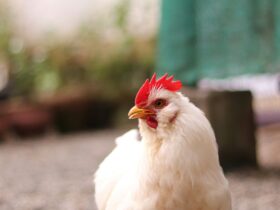

Hello!! Welcome to Anim Farm